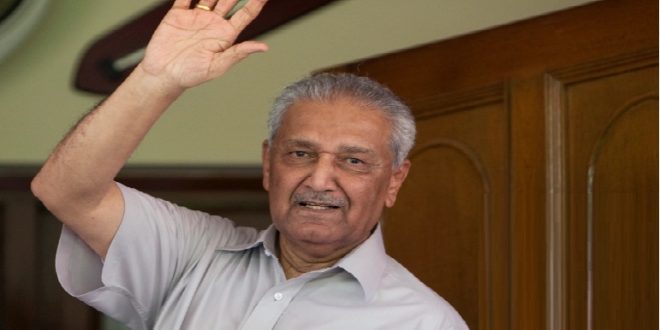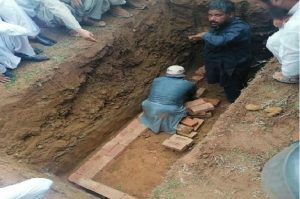10-10-2021
By SJA Jafri + Bureau Report + Agencies
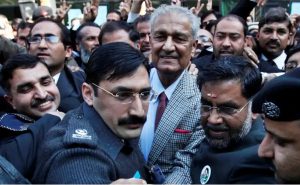 ISLAMABAD/ KARACHI: Abdul Qadeer Khan, revered as the father of Pakistan’s nuclear program, has died at 85.
ISLAMABAD/ KARACHI: Abdul Qadeer Khan, revered as the father of Pakistan’s nuclear program, has died at 85.
The Pakistani atomic scientist, hailed as a national hero for making his country the world’s first Islamic nuclear power but regarded by the West as a dangerous renegade responsible for smuggling technology to rogue states, was transferred to hospital with lung problems, state-run PTV said.
Khan had been admitted to the same hospital in August after contracting the coronavirus.
After being permitted to return home several weeks ago, he was transferred back after his condition deteriorated.
Pakistan’s Interior Minister Sheikh Rashid Ahmad said on Twitter that an urgent meeting “was called…to finalize arrangements for the funeral ceremony”.
Pakistan’s President Arif Alvi said he was “deeply saddened to learn about the passing of Dr Abdul Qadeer Khan”, whom he had known personally since 1982.
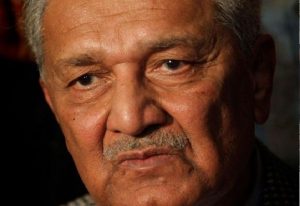 Khan was lauded for bringing Pakistan up to par with archrival India in the atomic field and making its defences “impregnable” but he found himself in the international crosshairs when he was accused of illegally sharing nuclear technology with Iran, Libya and North Korea.
Khan was lauded for bringing Pakistan up to par with archrival India in the atomic field and making its defences “impregnable” but he found himself in the international crosshairs when he was accused of illegally sharing nuclear technology with Iran, Libya and North Korea.
After a confession on national television, Khan was pardoned by then-president Pervez Musharraf but remained under house arrest for years in his palatial Islamabad home.
In 2006 Khan was struck with prostate cancer but recovered after surgery.
A court ended his house arrest in February 2009, but Khan’s movements were strictly guarded, and he was accompanied by authorities every time he left his home in Islamabad.
‘Kept prisoner’
Abdul Qadeer Khan, who made international headlines in 2004 after publicly confessing his role in global nuclear proliferation, has petitioned Pakistan’s top court to say he is being “kept prisoner” by government agencies and not allowed to plead his case for freedom of movement.
Khan, widely described as the architect of the nuclear weapons program in Pakistan that tested 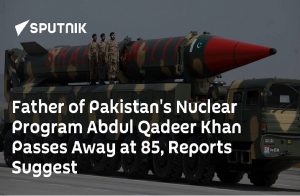 its first atomic bomb in 1998 to rival that of neighboring India, was sacked from his official position after his confession, but granted clemency by then-President Pervez Musharraf.
its first atomic bomb in 1998 to rival that of neighboring India, was sacked from his official position after his confession, but granted clemency by then-President Pervez Musharraf.
He has since lived a heavily guarded and mostly secluded life in an upscale Islamabad neighborhood. Authorities say he is under guard for security reasons.
“I had been kept as a prisoner having no free movement or meeting with anybody,” Khan said in a handwritten note submitted to the Supreme Court on Thursday.
The 84-year-old is said to have helped supply designs, hardware and materials to make enriched uranium for atomic bombs to Iran, Libya and North Korea.
A global nuclear watchdog, the International Atomic Energy Agency, had said Khan was an important part of the nuclear black market and had help from people in many different countries.
In a televised statement in 2004 after meeting Musharraf, who was also the chief of Pakistan’s powerful army, Khan stressed he acted independently and the government had not authorized his activities.
Western diplomats have long doubted whether he could have acted alone. Talking to The Guardian newspaper in 2008, Khan had said the confession “was handed into my hand”.
Khan filed a petition last year saying that, despite earlier court orders allowing him freedom of movement under agreed terms, he was still kept under restraint and in fear of “physical harm”.
On Thursday, he sent a note to the judges hearing his case saying he was to appear before them the day before, but agents of the Strategic Plans Division (SPD) did not take him to the courtroom despite bringing him into the court building.
The SPD is headed by the Pakistani military and responsible for handling the country’s secretive nuclear weapons program.
The government of Pakistan, which has been made respondent in the case, did not reply to Reuters news agency’s requests for comment.
The court has directed the government to respond to Khan’s petition.
“We haven’t received notice yet but it will come,” Pakistan’s Attorney General Khalid Jawed Khan told Reuters through a text message, adding the court has to decide if it will accept the petition for regular hearing.
Khan also said in his note to the Supreme Court that he was being forced to withdraw his petition to that court and take it to a lower court.
 Pressmediaofindia
Pressmediaofindia
